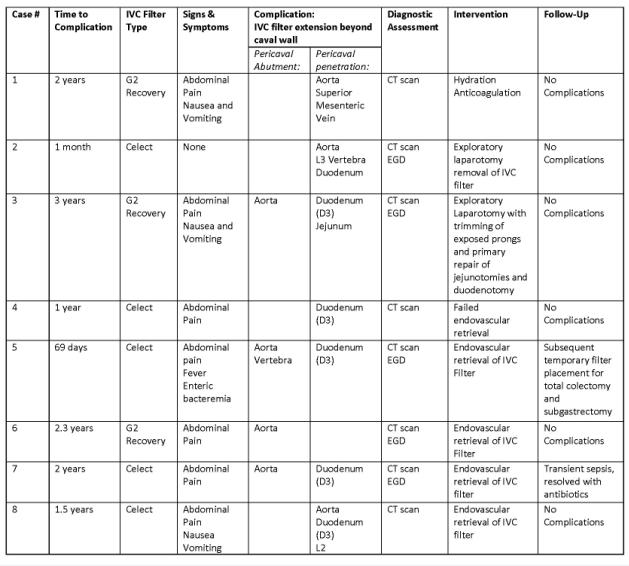|
Back to Annual Meeting Program
Management of Symptomatic Gastrointestinal Complications Associated with Retrievable Inferior Vena Cava Filters
Elizabeth A. Genovese, MD, MS, Geetha Jeyabalan, MD, Luke K. Marone, MD, Efthymios D. Avgerinos, MD, Michel S. Makaroun, MD, Rabih A. Chaer, MD.
University of Pittsburgh Medical Center, Pittsburgh, PA, USA.
OBJECTIVE: Symptomatic gastrointestinal (GI) complications associated with inferior vena cava (IVC) filters have been documented, however their management remains controversial. Most case series advocate open surgical filter retrieval; we describe a series of GI complications of retrievable IVC filters, detailing the spectrum of presenting symptoms and reporting multiple treatment options, including the safety of endovascular retrieval.
METHODS: A retrospective chart review was performed to describe the presentation and treatment of patients with GI complications associated with IVC filters from 2008-2012.
RESULTS: Eight patients had symptomatic IVC filter related GI complications (Table). One patient had SMV penetration and thrombosis and was treated with hydration and anticoagulation with resolution of his symptoms. Seven patients had duodenal perforation on CT scan, with 5 confirmed by EGD. Two patients underwent laparotomy without complications. The remaining 5 patients had attempted endovascular retrieval, 4 of which were successful; one patient failed endovascular removal, however his symptoms resolved and is currently being observed. During endovascular retrieval, both arterial and venous access was obtained in case of an aorto-caval strut penetration. A follow up CT scan was performed 48 hours post endovascular retrieval to rule out duodenal leak. Of the 4 patients who had successful endovascular retrieval, there were no complications except for transient sepsis in a patient who was not on perioperative antibiotics.
CONCLUSIONS: GI complications of IVC filters present with a wide spectrum of symptoms and frequent concomitant aortic strut penetration. Management options can be surgical or endovascular. Conservative management may be selectively used, when there is no clear evidence of viscus penetration. With filter penetration into the surrounding viscera, endovascular retrieval is feasible and appears safe. Precautionary considerations include concurrent arterial access for possible hemorrhage control in patients with concomitant aortic penetration, and perioperative antibiotics administration for duodenal penetration to prevent bacteremia.

Back to Annual Meeting Program

|

